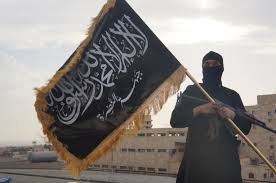Syrian rebels face another foe: Al Qaeda-linked militants
BAB AL HAWA, Syria — A group of Free Syrian Army rebels, run out of their hometown in northwestern Syria, hunkered down in an office with blacked-out windows.
Their commander had been killed and beheaded by an Al Qaeda-linked group a month earlier, the rebels said. Now these surviving FSA fighters were hiding here near the Turkish border.
Such mainstream rebel groups, formed to bring down the government of President Bashar Assad, increasingly find themselves in a battle against a different foe.
Walid Shawkan, the new commander of the displaced group, said fighters with the Islamic State of Iraq and Syria attacked his men in the town of Dana after a dispute over weapons. The Islamists seized the arms and declared the fighters from the Hamza Lion of God brigade to be apostates.
“They are not coming to fight the regime,” Shawkan said. “They are coming to fight us. We’re going to fight them first and then the regime.”
As the third year of the Syrian conflict drags on, the ambitions of extremist Islamic groups are growing. The presence of those militants has played an important role in the U.S. debate over the Obama administration’s plan to launch missile strikes against Syria to punish the government for its suspected use of chemical weapons. Some opponents say it puts the U.S. squarely on the side of groups aligned with Al Qaeda.
When the Islamist fighters emerged last year, many in the Syrian opposition accepted their help while also predicting a post-Assad battle with them because their vision for the country was deeply at odds with that of the mainstream rebels. This year, the Islamic State of Iraq and Syria publicly broke with Al Nusra Front, which had been the main Islamist and Al Qaeda-linked group in the country.
Since then, the Islamic State, which has more foreign fighters than other such groups, has grown more confrontational toward some of the rebel militias. Consequently, it seems that the battle with the Islamic State won’t wait.
In July, a senior FSA commander, Kamal Hamami, was shot and killed by the Islamic State in what the Supreme Military Council, the nominal head of the FSA, called an assassination. At the time, Col. Qassim Saad Eddine, spokesman for the council, said a member of the Al Qaeda-linked group had called him and threatened to kill all 30 council members.
The Islamic State has since routed three FSA groups from their northern communities — Jarabulus, Dana and, most recently, Raqqah province — part of its practice of establishing itself in areas already controlled by the opposition.
“They have opened a new front line for us; they work for the regime because they have distracted us from our fight against the regime,” said Ibrahim Hanano, commander of the Martyrs of Dignity’s Armor militia, which had given the Dana group refuge.
The emergence of the Islamist forces has also hurt the mainstream rebels by making the U.S. and other Western powers worry that if they provide military aid it could end up in the hands of terrorists.
Had it not been for the extremists in Syria “cutting off heads,” Saad Eddine said, the rebels would have been given weapons long ago.
In making its case for missile strikes, Obama administration officials have argued that the Islamist militants’ range and influence are limited.
“The opposition has increasingly become more defined by its moderation, more defined by the breadth of its membership and more defined by its adherence to some … democratic process,” Secretary of State John F. Kerry told the Senate Foreign Relations Committee last week.
In an attempt to ensure Western military support, the Supreme Military Council is forming what it bills as a professional and secular opposition army. Fighting groups are being divided into battalions that are numbered rather than given Islamic names.
Yet even as they seek to distance themselves from the Islamic State, mainstream rebel groups face a complex military landscape: the Islamic State has taken part in some of the biggest victories by the opposition, including the capture of the Mannagh air base near the Turkish border and advances in Latakia province.
Efforts by the FSA leadership to turn rebel groups against the Islamic State — akin to the Awakening movement spearheaded by the U.S. in Iraq — would probably fail in Syria, said Aymenn Jawad Al-Tamimi, a Shillman-Ginsburg fellow at the Middle East Forum and a columnist at Jihadology.net, who tracks the group online.
“It’s just so much more fragmented and complicated than what happened in Iraq,” Al-Tamimi said. “It would be hard to coordinate a unified Awakening movement against them, especially as long as the regime is around.”
Some rebel leaders gladly fight side by side with the Al Qaeda-linked figures.


